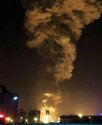broadsword
Brigadier
Sorry, Jeff. Did not mean to take anything away from the victory.
Times of Oman said:Riyadh: A "terrorist" bomb targeting a mosque used by Saudi police killed at least 17 people Thursday in the southern city of Abha, state television El-Ikhbariya reported.
The explosion took place as worshippers were praying at a mosque used by Saudi special forces in Abha, the broadcaster said, describing it as a "terrorist" attack. It gave no further details. An interior ministry spokesman confirmed the attack but gave a slightly lower toll of "more than 13" dead.
The victims were members of a Special Weapons and Tactics (SWAT) unit, the spokesman told AFP. "It's confirmed there's an explosion and there's more than 13 (killed)... in a mosque," the spokesman said.
The explosion happened at the headquarters of the SWAT team, which is tasked with domestic security, he added. It was too early to say who may have carried out the attack, he added.
>Internaltional Business Times said:A suicide bomb attack on a mosque in the Saudi Arabian city of Abha has left at least 17 people dead, according to state broadcaster El-Ikhbariya.
The bomber detonated an explosive as security forces in the Tawari neighbourhood performed noon prayers. More than 30 people were injured in the blast, according to reports from the scene
A security spokesman for the Saudi Ministry of the Interior confirmed the deaths of at least 10 special emergency forces members to news source Alhakea.
The spokesman later told the AFP that "more than 13" security forces members died. Those targeted were members of a SWAT unit, the spokesman said.
It was too early to say who may have carried out the attack, he added. The remains of a suicide belt were reportedly found at the scene.
Islamic State (Isis) jihadists have kept Saudi Arabia on alert recently as a series of attacks that killed police and members of the Shiite minority in the country have been attributed to them.
gCaptain said:Egypt unveiled its $8.5 billion expansion to the Suez Canal on Thursday, the first of a series of mega projects the government has promised to undertake to transform the country after years of turmoil.
The expansion of the canal was overseen by the military under order from President Abdel-Fattah El-Sisi.
Officials have played up the canal expansion’s potential to redraw the “map of the world” just as the 146-year-old original did, even as the shipping industry has doubted its necessity.
“Egypt is a great civilization with very few modern achievements,” said Samuel Tadros, a senior fellow at the Washington-based Hudson Institute. “El-Sisi understands this hunger among the Egyptian people for success in the world, and he’s giving it to them.”
The president, dressed in full military regalia, arrived at a lavish ceremony on board a yacht used by the last king to rule Egypt. Fighter jets buzzed the canal and the yacht was accompanied by a naval vessel.
“The new canal is just the first step of a thousand steps we have to take,” El-Sisi said in a televised speech as French President Francois Hollande and other dignitaries including Jordan’s King Abdullah looked on.
Gift to World
The expansion of Suez, a 193-kilometer (120-mile) link between the Red Sea and the Mediterranean, includes a new 35- kilometer channel and 37 kilometers of widening and deepening of the original. It allows two-way traffic and reduces transit time to 11 hours from 18, according to the operator. New ports and other facilities are also planned.
Cairo’s streets were adorned with billboards and flags praising El-Sisi and celebrating “Egypt’s gift to the world.” The state-run Al-Akhbar’s front page featured a picture of a prostrate El-Sisi with the headline: “Praise be to God.”
The new canal is a way “to show the world that while Egypt may have faced problems over the past few years, it is moving forward,” Shaimaa Ahmed, a 26-year-old mother of two, said in Cairo. “It’s something we can all take pride in — that it was built in a year and by Egyptians, and that it’s something the world can share.”
Locally Funded
Egyptian officials have pointed with pride to the project as one funded completely with local money. Egyptians snapped up 64 billion Egyptian pounds ($8.2 billion) of 5-year investment certificates issued to fund the project within days. Newspapers pointed out similarities with the 1956 nationalization of Suez, used by the government to finance the Aswan Dam after failing to secure foreign funding.
“Every few months the regime needs these sorts of celebrations to renew its bond with the people,” Tadros said. “In El-Sisi’s eyes, his legitimacy comes from these massive outbursts of Egyptians supporting him.”
Future projects promised include a new administrative capital east of Cairo, the reclamation of swaths of Egypt’s desert and the building of new urban centers.
The construction projects have boosted the economy, which grew above 4 percent in the nine months to March for the first time since 2010. That recovery may be short-lived, with security concerns and a shortage of foreign currency weighing on growth, a survey of business activity showed on Tuesday.
El-Sisi is building public support around the mega projects as an alternative to real political participation, according to Ziad Akl, a senior researcher at the Cairo-based Al-Ahram Center for Political and Strategic Studies.
“The government is using the project as a tool for consolidating its legitimacy,” he said. “They’re sending a message that achievements are taking place.”
According to my Dutch newspaper:
The job was cleared within a year, when before three year would have been considered fast work.It was done by four companies, two of them Dutch. Of the World's cutter-suction dredgers 60% were on this job. The work was done by 2000 people.
This job and the Chinese work in SCS show there has recently been a step change in the capabilities of wet civil engineering.
Man saves money by commuting from Barcelona to London for work
This week in weird business news…The rent is too damn high! At least it is in London…
In 2013, a British office worker tweeted that it would be cheaper for him to live in Barcelona and fly to his UK office each day than it would be to rent an apartment in London. Now 32-year-old Sam Cookney has put his money where he mouth is. He rents a 3-bedroom apartment in Barcelona and uses budget airlines to commute to his job in the morning.
To be fair, he only commutes once a week and works from home the rest of the week. But even if Cookney were to travel four times a week, he'd end up saving money. At the time of his move, a one-bedroom apartment in North London cost an average of $3195. Cookney was able to rent a two-bedroom apartment in central Barcelona with a rooftop garden for just $1300, including utlilities. Even with the cost of airfare, Cookey estimates he'd save about $878 each month.





